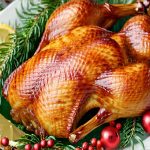The holiday season, while joyful for many, often comes with a predictable side effect: digestive distress. From Thanksgiving through New Year’s Day, we tend to deviate from our normal eating habits, indulging in richer, heavier foods and larger portions than usual. This sudden shift can overwhelm our digestive system, leading to uncomfortable symptoms like bloating, gas, heartburn, constipation, or even diarrhea. It’s not simply about what we eat, but also how much and how quickly we consume it, combined with potential disruptions to our routines that normally support healthy digestion – things like regular exercise and adequate sleep. Understanding why this happens and knowing how to gently nudge your system back on track can make a significant difference in enjoying the remainder of the festive season (and beyond).
Our bodies are remarkably adaptable, but they need time to adjust to changes. The digestive system, in particular, relies on consistent patterns. back-to-back holiday meals throw this consistency off balance. Increased fat intake requires more bile production, potentially straining the gallbladder. High sugar content can disrupt gut bacteria and lead to fermentation, causing gas and bloating. And larger portions simply mean your stomach has to work harder and longer to process everything, increasing the likelihood of acid reflux or indigestion. Many people also experience increased stress during the holidays, which directly impacts digestion – stress hormones can either speed up or slow down digestive processes, exacerbating symptoms. This isn’t a sign of weakness or failure; it’s a natural physiological response to an unnatural situation. You might even find comfort meals helpful during this time.
The Role of Gut Microbiota
The gut microbiota—the trillions of bacteria, fungi, viruses and other microorganisms residing in your digestive tract—plays a crucial role in overall health, and is particularly sensitive to dietary changes. These microscopic inhabitants help us digest food, absorb nutrients, and even regulate our immune system. When we consistently consume processed foods or large amounts of sugar and fat (as often happens during the holidays), we can disrupt the delicate balance of this ecosystem. This imbalance, known as dysbiosis, can lead to a range of digestive issues. A less diverse gut microbiome is also associated with increased inflammation, which contributes to discomfort and potentially long-term health problems.
Restoring gut health isn’t about eliminating all treats—it’s about incorporating foods that nourish beneficial bacteria. – Fermented foods like yogurt (with live cultures), kefir, sauerkraut, kimchi, and kombucha are excellent sources of probiotics – live microorganisms that can help repopulate the gut. – Prebiotic fibers found in onions, garlic, bananas, oats, and asparagus provide food for these beneficial bacteria, helping them thrive. – Limiting sugar intake and processed foods allows the gut microbiome to recover its natural balance. It’s also important to remember that individual responses to different foods vary significantly; what works well for one person may not work as well for another. If you’re experiencing discomfort after high-fat meals, addressing your diet is a great start.
Finally, stress management is key to a healthy gut. Chronic stress negatively impacts the gut microbiome, so incorporating relaxation techniques like meditation, yoga, or simply spending time in nature can be beneficial. The gut-brain axis—the bidirectional communication pathway between your digestive system and brain—is incredibly strong; taking care of one often benefits the other.
Strategies for Immediate Relief
When digestive trouble strikes after a holiday feast, immediate relief is often the primary concern. While these strategies offer temporary comfort, they aren’t long-term solutions – focusing on preventative measures (discussed later) is crucial. – Gentle Movement: A short walk can help stimulate digestion and relieve bloating. Avoid strenuous exercise immediately after eating, as this can sometimes exacerbate symptoms. – Hydration: Drinking plenty of water helps move food through the digestive system and prevents constipation. Herbal teas like peppermint or ginger can also be soothing. – Rest: Allowing your body to rest and focus on digestion is essential. Avoid lying flat immediately after eating, as this can worsen acid reflux.
Over-the-counter remedies such as antacids, simethicone (for gas), or loperamide (for diarrhea) may provide temporary relief, but should be used sparingly and according to package directions. It’s important not to rely on these medications as a substitute for addressing the underlying causes of digestive issues. If symptoms are severe or persist for more than a few days, seeking medical advice is essential. effective recovery can also provide some much-needed support during this time.
Long-Term Digestive Health Habits
Preventing digestive trouble in the first place is far more effective than simply treating it after it occurs. Establishing healthy habits around food and lifestyle can significantly improve your overall digestive wellbeing – not just during the holidays. – Mindful Eating: Pay attention to your body’s hunger and fullness cues. Eat slowly and savor each bite, allowing yourself time to register when you’re satisfied. This prevents overeating and gives your digestive system a chance to keep up. – Portion Control: Be mindful of portion sizes, even during festive meals. Using smaller plates can help visually control how much food you’re consuming. – Regular Exercise: Physical activity stimulates digestion and helps prevent constipation. Aim for at least 30 minutes of moderate-intensity exercise most days of the week.
Reintroducing Normal Eating Patterns
After a period of indulgence, gradually reintroduce your normal eating patterns. Don’t attempt to drastically restrict calories or embark on a strict diet immediately; this can further disrupt your digestive system. Instead: 1. Focus on Whole Foods: Prioritize fruits, vegetables, lean proteins, and whole grains. 2. Limit Processed Foods: Reduce your intake of sugary drinks, processed snacks, and fast food. 3. Increase Fiber Intake Gradually: Adding fiber too quickly can cause bloating and gas. Start with small amounts and gradually increase over time. 4. Listen to Your Body: Pay attention to how different foods affect you and adjust your diet accordingly. You may find that digestion slowing is a common issue after the holidays, but manageable with the right approach.
Remember that digestive health is a journey, not a destination. Be patient with yourself and focus on making sustainable lifestyle changes that support your overall wellbeing. Don’t view occasional indulgences as failures—they’re part of life! The key is to balance these moments with consistent healthy habits that nurture your gut and keep your digestive system functioning optimally. Sometimes even instability after skipping meals can contribute to issues, so consistency is important.


















